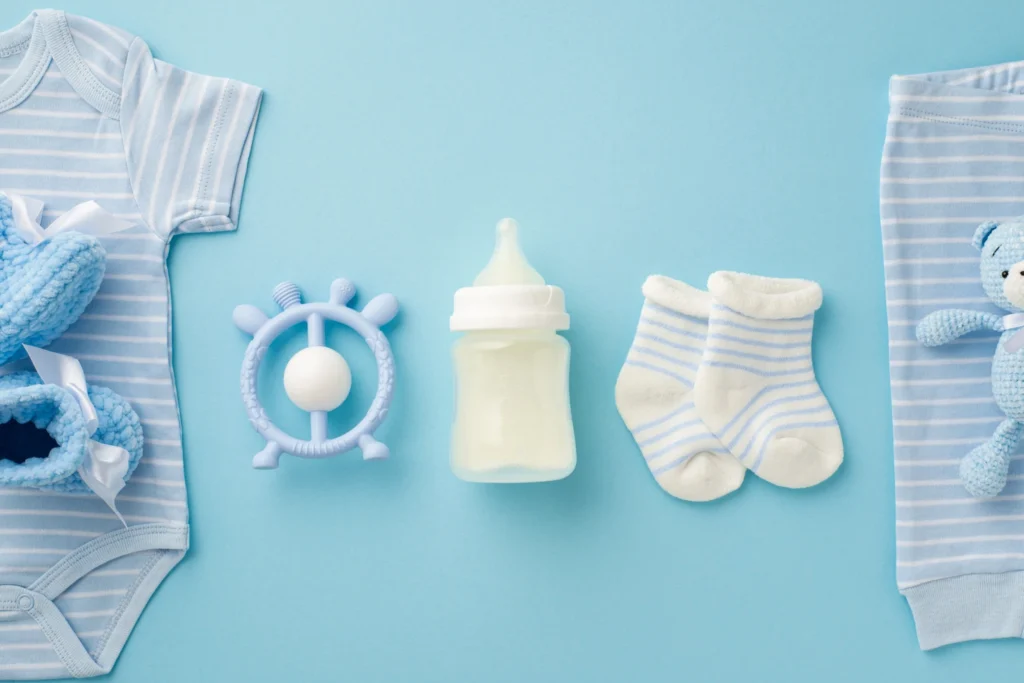When it comes to taking care of your baby, one of the most important decisions you’ll make is choosing the right products. From skincare to clothing and diapers, the market is flooded with options, and you might have found yourself wondering: should you go for organic baby products, or are regular baby products just as good? With growing awareness about environmental sustainability and health concerns, organic products have become increasingly popular. But is organic truly better, or is it just a trend? In this article, we’ll explore the differences between organic and regular baby products and help you make an informed decision for your little one.
What Are Organic Baby Products?
Organic baby products are those made from ingredients or materials that are grown without the use of synthetic fertilizers, pesticides, or genetically modified organisms (GMOs). For baby products, this typically includes:
- Organic baby skincare: Made with natural, non-toxic ingredients such as aloe vera, shea butter, and coconut oil, all grown without chemicals.
- Organic baby food: Produced without the use of harmful pesticides, fertilizers, or synthetic additives. Ingredients are often non-GMO and grown in certified organic farms.
- Organic baby clothing: Made from organic cotton or other fibers that are grown without chemicals, ensuring minimal exposure to harmful substances.
- Organic diapers: Diapers that are made from organic cotton and other natural materials, typically free from chlorine, synthetic fragrances, and other harmful chemicals.
Organic baby products are often certified by recognized organizations, such as the USDA Organic seal, which ensures that the product meets strict standards in terms of production and ingredient sourcing.
What Are Regular Baby Products?
Regular baby products, on the other hand, include items that may contain synthetic chemicals, non-organic materials, or genetically modified ingredients. These products are not necessarily harmful, but they are produced using conventional farming and manufacturing methods, which may include the use of:
- Conventional skincare: Contains synthetic fragrances, preservatives, and other chemicals that may irritate sensitive baby skin.
- Non-organic baby food: Produced with conventional farming practices, often using pesticides, herbicides, and other chemicals that might leave residues in the food.
- Regular baby clothing: Made from cotton or other fibers that may have been treated with pesticides or chemicals during the production process.
- Disposable diapers: Diapers made with synthetic materials such as plastic and chlorine, and often containing fragrances and dyes.
While regular baby products are more commonly available and generally more affordable, they can sometimes pose risks due to chemical exposure, especially for babies with sensitive skin or allergies.

Key Differences Between Organic and Regular Baby Products
1. Ingredients and Materials
The most noticeable difference is the ingredients and materials used in organic and regular baby products.
- Organic baby products are made with natural, non-toxic ingredients that are carefully selected to minimize harmful chemical exposure.
- Regular baby products often contain synthetic chemicals, preservatives, fragrances, and non-organic materials like conventional cotton, which may have been treated with harmful chemicals.
For example, organic baby lotions typically feature plant-based ingredients like chamomile or calendula, while regular lotions may include synthetic chemicals like parabens or phthalates, which are linked to health concerns.
2. Health Considerations
Many parents choose organic baby products because they believe they’re healthier for their babies. Babies, especially newborns, have more sensitive skin and are more vulnerable to the chemicals they come into contact with.
- Organic products reduce the risk of chemical exposure, which is particularly important for babies who are still developing their immune systems. Organic skincare items are free from artificial fragrances, parabens, and other harmful ingredients that can cause skin irritation or allergic reactions.
- Regular products, while still generally safe, might contain ingredients that are known to cause sensitivity in some babies. Harsh chemicals and synthetic dyes used in regular baby lotions, wipes, and shampoos can sometimes irritate delicate skin.
Organic baby food is another area where health concerns come into play. Conventional baby food might contain pesticides, additives, or preservatives, while organic options are free from these harmful substances.
3. Environmental Impact
Another factor to consider when choosing between organic and regular baby products is their environmental impact.
- Organic baby products are grown and produced with sustainability in mind. Organic farming methods do not use harmful pesticides, herbicides, or synthetic fertilizers, which reduces environmental pollution and supports biodiversity.
- Regular baby products, particularly those that rely on conventional cotton, can contribute to environmental damage due to pesticide use and the heavy reliance on chemicals. Additionally, non-organic cotton farming uses more water and land resources, which can lead to soil degradation and increased carbon emissions.
By choosing organic, you’re supporting environmentally friendly practices that help reduce the negative impact on the planet.
4. Price Difference
One of the biggest factors that influence parents’ choices between organic and regular baby products is price. Organic items are generally more expensive due to the more expensive and labor-intensive farming practices, certification costs, and the premium materials used.
- Organic products typically come with a higher price tag, which might be a consideration for families on a budget. However, many parents feel the extra cost is worth it for the added peace of mind and the potential long-term health benefits.
- Regular products, on the other hand, are usually more affordable and widely available, making them a budget-friendly option for many families.
Which Should You Choose?
Ultimately, whether to choose organic or regular baby products depends on your priorities as a parent. If you’re concerned about potential chemical exposure, environmental impact, and your baby’s health, organic products may be the better choice. They provide a more natural, sustainable, and safer alternative, particularly for babies with sensitive skin or allergies.
However, if you’re working with a budget, regular baby products can still be safe and effective. Many manufacturers are now prioritizing safety and quality in their production processes, so regular products can also meet high standards of care for your baby.
Conclusion
Both organic and regular baby products have their pros and cons. Organic baby products offer natural, chemical-free alternatives that promote health and sustainability, but they come at a higher cost. Regular baby products are typically more affordable and still meet safety standards, but they may contain synthetic chemicals or materials that could irritate sensitive skin.
Ultimately, the choice between organic and regular products will depend on your budget, your concerns about sustainability, and your baby’s specific needs. Whichever you choose, the key is to select high-quality, safe, and effective products that will support your baby’s health and well-being.











